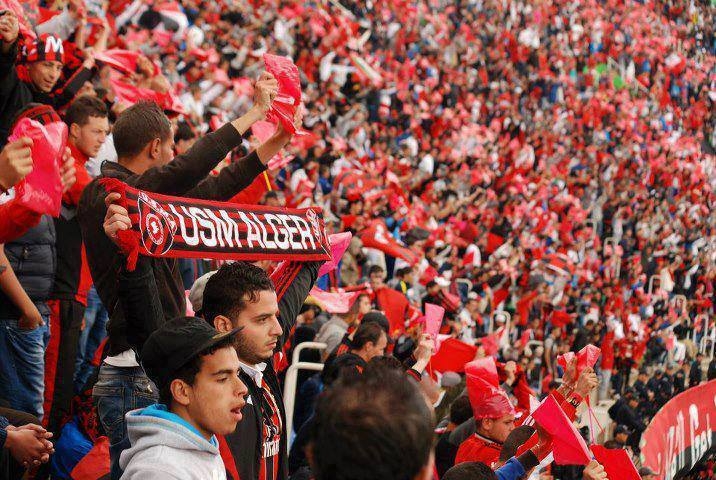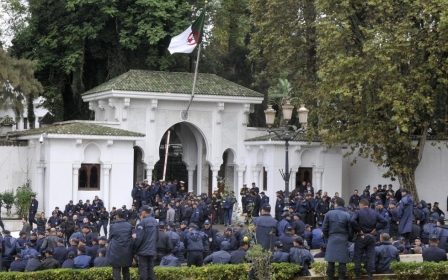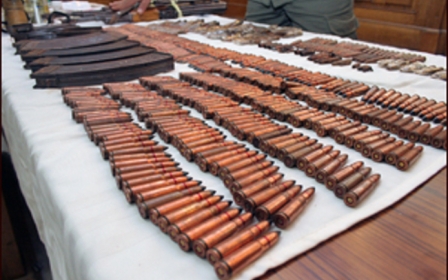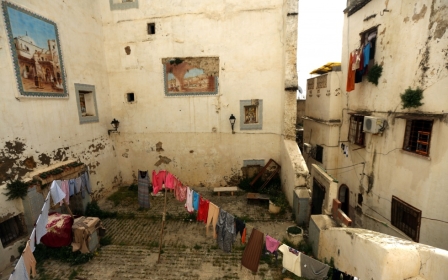Algerian football fans sing songs of freedom

This month Algeria celebrates the beginning of the war for independence from France that ignited on the night of 1 November 1954. A group of young Algerian revolutionaries set off nearly 30 explosions around the capital targeting colonial government symbols, and signaling that the revolution had begun. The revolutionary generation of young people who fought to free the country of its colonial chokehold went on to lead the newly independent Algeria in 1962. Fast forward sixty plus years, those same war heroes, now aged and elderly, are still ruling the country.
President Bouteflika a member of this generation of war heroes has been the country's sitting President for more than 15 years, and has ruled in part based on his revolutionary legitimacy. But that legitimacy is fading, particularly among the country's 26 million young people. The ailing 77-year-old’s rule has become an allegory for the malaise in Algeria today: a decrepit president clinging to power in a country where more than 67 percent the population is under 30.
Just a month before Algeria’s last election, the country’s football fans adopted a new chant. Criticizing everyone from the ageing president, Abdelazizi Bouteflika, to the country’s corrupt businessmen, they sang: "Elections are coming up, and Bouyahaya (an allusion to the prime minister) got dressed up and elected himself again".
This generational divide between the rulers and the ruled is a problem throughout the region. But Algeria’s youth have a distinct character, which has been shaped by the country’s recent past.
A bloody civil war raged across the country throughout the 1990s, the economy was in decline, unemployment was rampant, housing was in short supply and education standards were in a state of decay. The current generation of young Algerians came of age amidst this failure of the national project, with the same president (Bouteflika) in power throughout their lifetime. Today, Algeria is the 6th biggest natural gas exporter, with vast foreign currency reserves, but one in four young people cannot find a job – and the other three are underemployed despite their university degrees. It's a country where bribes and having a connection – or "piston" – is often the only way to land a job or get a visa or a license to open a business. Aissa Kassa, a spokesman for the ruling FLN party, has described Algeria’s youth as “demanding” and “volcanic”. Unable to comprehend their desires, Kassa dismisses them, saying “they’re living in an unrealistic world”.
But the truth is, the government has proved themselves incapable of improving people’s lives, and political opposition movements - from the communists to the Islamists - have been just as full of curmudgeons and as incapable of hearing (much less articulating) the desires of young people, as those in power. As a result, young Algerians - particularly in urban areas - have simply dropped out of the civil sphere en masse. An embodiment of the country's disaffected youth, on one extreme, we find the hittis, and at the other, the harraga.
The term hitti from the Arabic word for “wall”, describes Algeria's unemployed youth who spend their days leaning on walls, cigarette in hand, doing nothing, going nowhere. The term harraga from the Arabic word “to burn”, describes the young people who burn their identity papers in order to make the suicidal dingy crossing across the Mediterranean to seek asylum. According to UN figures, in 2014 alone, more than 2,500 migrants have drowned making the journey and yet emigrating is a dream of millions of young Algerians. A 2002 survey revealed that a staggering 44 percent of young men planned to emigrate out of the country. Twenty-nine percent of young women said they planned to do so, too.
However, between the harraga and the hittis, there are a handful of groups and subcultures where young Algerians are fashioning their identities in stark opposition to the state, most noteworthy among them are the football fans. Consciously separating themselves from the failed politics of the state, this group has created an alternative, overtly apolitical space in which to express their collective desires and frustrations.
In 2011, I was in Algiers to report on whether Arab Spring protests would make their way West from Tunisia. In the centre of the city, nearly 100 protesters gathered. For every middle-aged, middle-class protester that showed up in the city centre that day in February, there were four policeman decked in riot-gear. But outnumbering both the policemen and the protesters where the young football fans who had also gathered on the sidelines, observing the spectacle. They stood huddled together, smirking and every now and then they burst into song.
One memorable song appropriated the infamous chant of the Arab Spring, with a slight modification: “Al Sha'ab yurid zetla!" they mockingly sang, "The people demand free hashish!" As the short-lived demonstration was broken up by the police, protesters were beaten and arrested while the young football fans continued to watch from the sidelines with bemusement. None of these fans would ever take part in a protest. They perceive the opposition as impotent, and protests as an exercise in futility. But in the confines of the stadium, the songs they sing are charged with political meaning – words that they'd be beaten and arrested for uttering out loud in a protest.
This new breed of football fan has its roots in the 1990s, when national patriotism was eroded and the significance of the city, and the neighbourhood "harra” rose as a source of identity. The popularity of the local football clubs grew as a result. Young people began to forge their sense of identity and loyalties in relation to the neighbourhood, and the football club. Thus, young Algeriwa (residents of Algiers) identified themselves with the capital's USMA club, kids in Oran raised the white and red Mouloudia flag, while those in Tizi Ouzou brandished the JS Kabylie banner. All around the country, young people became loyal to their local teams, and the football stadium became one of the only spaces where marginalised young people could feel a sense of belonging and freely assemble. Football chanting is an art in Algeria, every club has its own distinct chants and song writers, its own drummers and ad hoc instrumentalists, and every football club in Algeria sings about overtly socio-political issues. The stadium is now the place where young Algerians can openly express themselves, shout their frustrations, declare their desires and sing about their dreams.
Singing in a slang that's a mixture of Arabic and French, no one is spared in the songs: the President, the military and even the opposition Islamists are targets of their anger and contempt.
The young are constantly dismissed by those in power as unpatriotic, apathetic criminals, drug addicts and hooligans, but the fans’ understanding of the political situation can be seen as quite sophisticated. All issues are broached in the songs: from the harragas’ desire to emigrate, through the hittis’ boredom and frustration, to the government’s impunity and corruption.
Young Algerian's rampant unemployment and inability to participate in the economy, either as consumers or businessmen is echoed in this song which USMA football club fans sang in Algiers in 2011: "We can't buy and we can't sell anything," they lament. In response to complaints that some Algerians didn't have enough to eat, the Prime Minister once famously said, "they don't need to eat so much yogurt," a let-them-eat-cake-esque comment. In another football song, fans lambast the man who has "begrudged us even our yogurt". The song goes on to criticise the impunity enjoyed by the country's most powerful men:
"Chakib Khalil [a former minister accused of embezzlement] stole millions… and no one held him accountable;
Rafik Khalifa [former head of El Khalifa Bank, also accused of embezzlement] came to the airport… and no one held him accountable;
And the head honcho [Bouteflika] is running around in a hospital gown… and no one held him accountable."
Many of the songs are recorded on mobile phones and posted online, generating hundreds of thousands of views. The independent identity being fashioned by these fans in the stadium lives online, accessible to young people across Algeria.
It is striking that, in the videos, no one is concealing their identity or covering their face; no one is afraid, young people are chanting loudly against the regime and the failures of the state and they are not censoring themselves. In the 2014 video of Mouloudia fans lambasting the upcoming election (“Bouyahaya got dressed up and elected himself again”), a policeman in uniform stands a few feet behind the singing fans, unbothered, lazily leaning against the wall. Quite literally at the same moment, in downtown Algiers protesters peacefully calling for a boycott of the vote, were being arrested and viciously beaten by the police.
Vast swathes of young Algerians have rejected democratic channels of dissent as futile - the outcome of elections is always a foregone conclusion, protests and boycotts are violently punished, opposition groups are self-serving and impotent and civil society is virtually non-existent. It is in the young football fans’ songs that we hear the authentic views of Algeria’s young people, the majority of the population. Young Algerian football fans, dismissed as hooligans and written off as stupid and apathetic, have fashioned their own spaces for expression, and today, as free expression becomes an increasingly scarce commodity in Algeria, their chants and lyrics serve as one of the most accurate barometers of authentic popular sentiment in the country.
Middle East Eye propose une couverture et une analyse indépendantes et incomparables du Moyen-Orient, de l’Afrique du Nord et d’autres régions du monde. Pour en savoir plus sur la reprise de ce contenu et les frais qui s’appliquent, veuillez remplir ce formulaire [en anglais]. Pour en savoir plus sur MEE, cliquez ici [en anglais].




